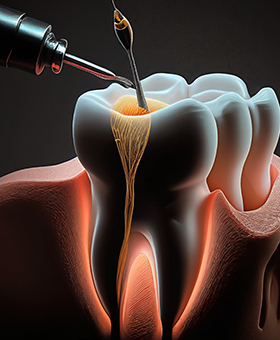In the past, the worst thing a dental patient could hear would be “you need a root canal.” However, this procedure’s dubious reputation is quite undeserved! The pain often associated with it actually stems from the infection located in the tooth. The treatment itself largely causes little to no sensation due to Dr. Lively’s use of the latest dental technologies and techniques. If you have a tooth that just won’t stop hurting, a root canal might be exactly what you need to enjoy lasting relief.
Root Canal Treatment – Mangum, OK
Nothing To Fear Anymore

Why Choose Us for Root Canal Treatment?
- Sedation dentistry delivers comfortable experiences
- Highly skilled & compassionate team
- State-of-the-art facility
Do I Need Root Canal Treatment?

Your teeth are actually composed of three layers: the enamel on the outside, the dentin underneath, and the dental pulp at the center. This contains a number of blood vessels as well as a sensitive nerve. If bacteria are able to reach and infect it (either due to a cavity or crack in the enamel), it can cause quite a bit of pain as a result. The only way to repair this kind of damage and save the tooth from extraction is with… you guessed it, a root canal.
The Root Canal Process

After we determine that you could benefit from a root canal, the procedure will involve the following steps:
- Our Mangum emergency dentist , Dr. Lively, will thoroughly numb your tooth with local anesthetic.
- Once you can’t feel a thing, he’ll create a small hole in the enamel so he can reach the infected pulp.
- He’ll remove the pulp, and the tooth will then be cleaned, sanitized, and filled.
- At a follow-up appointment, Dr. Lively will rebuild the enamel using a custom-made crown.
Afterward, the treated tooth can be expected to look, feel, and function normally for many years to come. Thanks to Dr. Lively’s skilled hands, most patients say the procedure feels like just getting a small filling.
The Benefits of Getting a Root Canal

Despite what its reputation would have you believe, root canals don’t cause pain, they alleviate it! So, if you’ve been dealing with a persistent toothache, discomfort when biting down, and other unpleasant dental symptoms, this treatment may be the only way to restore your pain-free smile. It’s also important to note that root canal treatment can actually save your tooth, preventing it from needing to be extracted. Plus, we will use a lifelike restoration to protect your treated tooth moving forward, ensuring no negative attention is drawn to your smile.
Since root canal treatment continues to be a feared procedure, we know that our patients have lots of questions on their minds. Please know that they are welcome here! Whether you want to learn more about the treatment process, sedation dentistry, or how to schedule your next appointment, don’t hesitate to give us a call .
Understanding the Cost of Root Canals

Typically, people who are getting a root canal have enough on their mind without stressing about payment. We want your time with us to be as comfortable as possible, and part of that is ensuring the process of budgeting for care is easy.
We’ll talk to you as much as you’d like about affording dental care when you see us. Before then, here’s what you should know about the cost of root canals.
Factors That Can Affect Root Canal Cost

As easy as it would be to just say what root canals cost, the fact is that we can’t guarantee a price until we meet you in person. That’s because there are several variables that can affect the price of root canal treatment.
For one, there’s the type of tooth being treated. Molars have three root canals while incisors have only one, which means that molars are more complicated to deal with. Then there’s the cost of the dental crown that finishes up the root canaled tooth.
Finally, you should think about who will be performing your root canal treatment. In the case of more complex procedures, Dr. Lively may opt to refer you to a specialist. These specialists will have their own rates for care, so you’d have to consult with them to know fully what treatment will cost.
Is it Cheaper to Pull My Tooth?

Typically, root canal treatment plus a crown will incur a higher up-front cost than a tooth extraction. While root canals come with the obvious benefit of allowing you to keep your natural tooth, budget-conscious patients sometimes would rather just get rid of your tooth for monetary reasons.
However, you’d be hard-pressed to find a dentist that would recommend just leaving things at a tooth extraction. If you leave an empty spot in your smile, the surrounding teeth could start to move to fill the gap, causing the teeth to become misaligned. For this reason, in addition to the tooth extraction itself, you’ll have to factor in the price of a dental bridge or a dental implant.
When factoring in the cost of tooth replacement, it’s often cheaper to make use of root canal treatment and keep your original tooth in the process.
Does Dental Insurance Cover Root Canals?

Root canal therapy is typically only done when they’re considered to be medically necessary. In such cases, most dental plans will cover at least a portion of the care, typically anywhere from 50-80% of the final treatment. We’ll be able to help you deal with your insurance company in order to ensure that you are making the most of your dental coverage.
Other Options for Making Root Canal Treatment Affordable

Even if you don’t have insurance, or if you’ve already met your yearly maximum, you don’t have to forego necessary dental care. We have options available to our patients outside of insurance that can aim to make root canal treatments more affordable.
One option we often recommend to our patients is CareCredit, which is a firm that focuses on healthcare financing. Like a credit card, you can use CareCredit to finance your care and then make monthly payments until the balance is paid off.
We wouldn’t recommend you a root canal unless you truly believe that you need one, so if you are worried about affording care, let us know and we’ll work with you to find financing options.
Root Canal Treatment FAQs

How Long Do Root Canals Last?
Root canals have very high success rates. Most teeth that have been treated with a root canal go on to provide full, healthy chewing function for many years to come or even for a lifetime! The longevity of your root canal will depend on a variety of factors, including the amount of time that elapses between placing the temporary and permanent crown. To keep your root canal in excellent shape for as long as possible, be sure to carefully follow your dentist’s post-op instructions and practice an excellent oral hygiene routine.
Do I Need Antibiotics Before or After My Root Canal?
Most patients don’t need to take antibiotics before or after they get a root canal. You will probably only be prescribed antibiotics beforehand if you have a health condition that increases your risk of developing an infection after a major dental procedure. Your dentist will go over your medical history with you beforehand to determine whether or not prescribing antibiotics would be a good idea for your individual situation.
Can Root Canals Be Prevented?
The best way to prevent the need for a root canal is to take excellent care of your oral health. This includes keeping up a good oral hygiene routine, like brushing, flossing, and using mouthwash on a daily basis. You should also maintain a healthy diet by limiting sugar, eating lots of nutritious foods, and drinking plenty of water. Be sure to always wear a mouthguard while playing sports. Chipped and cracked teeth are vulnerable to bacteria, so they often require a root canal to prevent infection from worsening.
Why Do I Need a Root Canal if My Tooth Doesn’t Hurt?
Intense tooth pain is a common sign that you may need a root canal, but it isn’t the only sign. Just because there isn’t any pain doesn’t mean that the tooth is healthy. In fact, some patients have their tooth’s nerve die, so it can no longer register pain. This is why it is so important that you attend regular cleanings and checkups. It may not feel urgent, but you should always schedule a root canal as soon as it’s recommended by your dentist to prevent further damage to the tooth or surrounding teeth.

